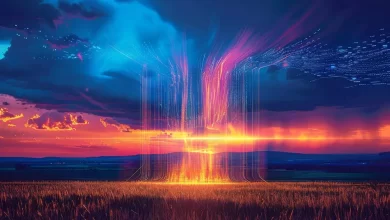The UK needs to act urgently if it hopes to meet the targets laid out at COP26. Already, the government has been hit by lawsuits from environmental groups claiming the climate goals are ‘imaginary’ and based on ‘unproven technology’. To achieve the UK’s net-zero goals by 2050, our reliance on fossil fuels must end. To make this a reality, the UK must build a strong energy system powered solely by renewables, and supported by artificial intelligence (AI), that can withstand the uptick in electricity use in the decades to come.
To meet our 2050 net-zero goals, we must halve carbon across energy and mobility every decade by completely overhauling how we generate, store and use energy. Traditional systems are no longer fit for purpose. It’s time for the sector to leverage AI further to help innovate and speed up our fight against climate change, and allow more renewable energy to be shared back to the grid.
The current state of the National Grid
Traditionally, power comes from a few natural gas, coal and oil fueled power stations. When there’s lots of demand on the system, higher quantities of these fossil fuels are burnt to accommodate the increase. This ensures electricity supply meets demand, keeping the grid balanced. This perfect balance is consistently needed to ensure that the electricity system is fit for purpose in providing the correct amount of power, without overloading the grid and causing blackouts.
With the government pledging a transition away from fossil fuels, energy is now starting to be produced by variable renewable sources of power, like wind and solar, making it harder to keep this balance. This is where AI comes into its own.
As the UK moves away from one centralised energy system, AI is needed to ensure this new, renewable system can function effectively, without compromising customers’ needs. AI, supported by machine learning, can be used to predict household solar generation and consumption to produce the right amount of energy at the correct times, ultimately saving customers money on their energy bills. A new decentralised energy system means AI will be crucial both in energy, and the UK reaching its climate goals over the course of the next decade.
Increasing the IQ of batteries
To decarbonise the electricity system, we need to focus on increasing renewable energy generation while simultaneously counteracting its intermittent nature. To achieve this, we must leverage energy storage technology and AI, in order to balance the grid on a second-by-second basis and provide long-duration energy storage to handle cold, still, cloudy winter days.
Smart household batteries will play an important role. Rather than having to curtail renewable energy, intelligent batteries allow households to store excess renewable energy. By making these batteries work smarter through AI and machine learning, households can not only save money, but they can be linked together into virtual power plants (VPPs) to help keep the grid balanced.
$14 trillion in electric grid investments is needed globally to keep up with the increase in renewable energy on the grid. Increasing the IQ of home energy storage solutions will prove essential in lowering these costs, and ultimately achieving our 2050 net-zero goals.
Using AI to increase the flexibility of a green power system
VPPs are a cloud-based, decentralised network of power generation systems that can provide grid balancing services. They achieve this by discharging the solar energy stored in batteries to help power households, or charging up from the grid when there is excess green energy. Increasing flexibility is the key to a greener, and cheaper, energy future, and in order to get that flexibility without burning gas, we will need VPPs.
Through the use of AI, fleets of optimised batteries can deliver flexibility services when required in a way that benefits customers and the grid. Integrating more intelligent batteries into UK households to create local VPPs, will enable people to become active participants in the energy landscape, and support the mass deployment of renewable energy.
AI technology could also facilitate the growth of a peer-to-peer energy network that allows smart batteries to communicate with other batteries in the local area, exchange energy, and further reduce the electricity that each household needs to buy from the grid. This will lower electricity bills, and allow for localised energy trading, keeping value in communities. Distributed energy assets will not only help to decarbonise the power system – they will democratise it, as well.
Leveraging AI to ensure distributed energy systems operate at maximum efficiency, while enabling active consumer participation is the key to unlocking their value and reducing our reliance on fossil fuels.




